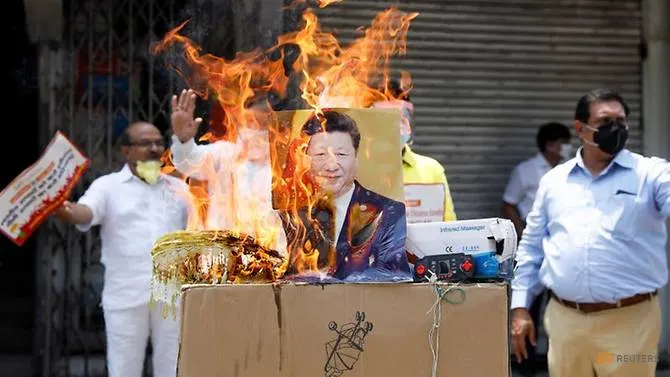China-India border clash stokes contrasting domestic responses
24 June, 2020

The skirmish between Chinese and Indian troops over a long-disputed border this month has been treated in New Delhi as the country's worst diplomatic crisis in decades even as it is downplayed by Beijing.
China has already been locked in diplomatic fight over a bunch of disputes, from america and Australia to Taiwan and Hong Kong, and its handling of the COVID-19 outbreak. It is loath to activate on just one more front - specifically one that could force New Delhi nearer to Washington, some analysts declare.
The two sides were attempting to ease tensions, China's foreign ministry said on Tuesday (Jun 23). Chinese mass media policy has been scant.
Beijing's response also tips to its interest in deescalating an emergency over a stretch of border that's less politically important than other territorial priorities, such as promises to Taiwan and the South China Sea and its tightening grasp on Xinjiang and Hong Kong.
The contrast reflects the differences in two systems of government - India is the world's biggest democracy, while China is ruled simply by the Communist Get together and tightly handles its media - in addition to the domestic realities of a dispute which has little political upside for the leaders of either country.
Because the deaths of 20 Indian soldiers in hand-to-hand fighting in the Galwan Valley, in the worst type of combat losses on the de facto border with China in a lot more than 50 years, Indian Prime Minister Narendra Modi, a strident nationalist, has faced heated demands a strong response.
Chinese President Xi Jinping is usually under no such open public pressure.
"Indians look at everything that China is doing, but most Chinese sole have eye for international issues linked to the US or perhaps Taiwan," explained Zhang Jiadong, director of the Center for South Asian Research at Fudan University in Shanghai.
Both governments would like to play downward the clash, he said, but information from the remote battlefield leaking into Indian media forces Modi's submit a way that could not be practical in China.
"The clash happened because troops from both sides include a different understanding of where the type of genuine control lies," he stated.
"This area is a barren hilltop without economic or geo-strategic benefit. From the Chinese federal government point of view, it isn't value destabilising bilateral relations over this,” said Zhang.
The border clash did not crack the top 50 searches on China's Twitter-just like Weibo on Tuesday.
PRESSURE DIFFERENTIAL
In India, opposition leaders, former generals and diplomats have criticised Modi for failing to protect Indian lives and territory. Many have needed boycotts of Chinese items. The report garners wall-to-wall coverage in domestic media.
The perceived threat from China - which humiliated India in a short border war in 1962 - has overshadowed India's COVID-19 crisis, where the number of instances has crossed 400,000 without sign of a peak.
Former Primary Minister Manmohan Singh explained India stands behind Modi, but he need to bear responsibility.
"We stand at historic crossroads. Our government's decisions and actions could have serious bearings on how the future generations perceive us," he said.
Such language makes it harder for Modi to compromise without losing face, analysts say.
Modi rode to electric power found in 2014 vowing to carefully turn India into an monetary and military power, but China has pulled even more ahead on his look at. Its economy is normally five times the size of India's, with 3 x the military spending.
Control Risks said in an email that Modi's administration will probably employ economic measures against China to placate consumer pressure, rather than risking military conflict with a stronger adversary.
Source:
